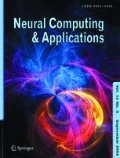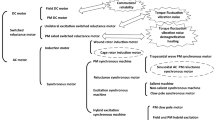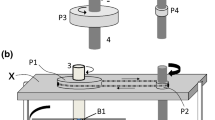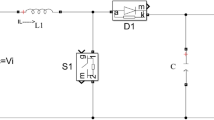Abstract
In this study, the determination of equivalent circuit parameters of induction motors is carried out with differential evolution algorithm (DEA) and genetic algorithm (GA). As an objective function in the algorithms, the sum torque error at zero speed, pull-out, and rated speed is used. The determination of equivalent circuit parameters is performed with three induction motors of 2.2, 5.5, and 37 kW. In particular, the search ability of DEA is compared with GA by using the same population size, number of iteration, and crossover rate. In addition, the effects of the obtained equivalent circuit parameters on induction motors characteristics are investigated and presented with graphics. The results show that the use of DEA instead of GA increases the convergence sensitivity and reduces the simulation time.







Similar content being viewed by others
References
Murat İE (2002) Self commissioning and online parameter identification of induction motors, Ms Thesis, METU
Arabacı H, Bilgin O (2010) Automatic detection and classification of rotor cage faults in squirrel cage induction motor. Neural Comput Applic 19:713–723
Atkinson DJ, Acarnley PP, Finch JW (1991) Observers for induction motor state and parameter estimation. IEEE Trans Ind Appl 27(6):1119–1127
Proca AB, Keyhani A (2002) Identification of variable frequency induction motor models from operating data. IEEE Trans Energy Conv 17(1):24–31
Alonge F, D’Ippolito F, Raimondi FM (2001) Least squares and genetic algorithms for parameter identification of induction motors. Control Eng Pract 9(6):647–657
Wishart MY, Harley RG (1995) Identification and control of induction machines using arificial neural networks. IEEE Trans Ind Appl 31(3):612–619
Ursem RK, Vadstrup P (2003) Parameter identification of induction motors using differential evolution. In: Proceedings of the fifth congress on evolutionary computation (CEC-2003). IEE Press, Piscataway, pp 790–796
Kim JW, Kim SW (2005) Parameter identification of induction motors using dynamic encoding algorithm for searches (DEAS). IEEE Trans Energy Conv 20(1):16–24
Benaidja N, Khenfer N (2006) Identification of asynchronous machine parameters by evolutionary techniques. Electric Power Components Syst 34:1359–1376
Benaidja N (2009) Soft computing identification techniques of asynchronous machine parameters: evolutionary. Strategy and chemotaxis algorithm. Turk J Elec Eng Comp Sci 17(1):69–85
Çunkaş M, Sağ T, Arslan M (2009) Determination of induction motor parameters by differential evolution algorithm and genetic algorithms. The 2nd international conference on advanced computer theory and engineering (ICACTE 2009), Cairo, Egypt, 1, pp 777–784
Mahdavi M, Jalilzadeh S (2009) Advanced particle swarm optimization for parameter identification of three-phase DFIM. IEEE international conference on intelligent computing and intelligent systems (ICIS 2009). Shanghai, China, pp 580–584
Awadallah MA (2008) Parameter estimation of induction machines from nameplate data using particle swarm optimization and genetic algorithm techniques. Electric Power Components Syst 36(8):801–814
Hsu LY, Tsai MC, Huang CC (2003) Efficiency optimization of brushless permanent magnet motors using penalty genetic algorithms. IEEE electric machines drives conference, IEMDC’03 (vol 1, pp 365–369)
Çunkaş M (2010) Intelligent design of induction motors by multiobjective fuzzy genetic algorithm. J Intell Manuf 21:393–402
Trebi-Ollennu A, White BA (1997) Multiobjective fuzzy genetic algorithm optimization approach to nonlinear control system design. IEE Proc Control Theory Appl 144:137–142
Bingul Z, Sekmen S, Palaniappan S, Sabatto S (2000) Genetic algorithms applied to real time multiobjective optimization problems. In: Proceedings of the IEEE southeast congress conference
Im CH, Jung HK, Kim YJ (2003) Hybrid genetic algorithm for electromagnetic topology optimization. IEEE Trans Magnet 39(5):2163–2169
Hwang SF, He RS (2006) Improving real-parameter genetic algorithm with simulated annealing for engineering problems. Adv Eng Softw 37(6):406–418
Storn R, Price K (1995) Differential evolution- a simple and efficient adaptive scheme for global optimization over continuous spaces. Technical Report TR-95-012, International Computer Science Institute, Berkley
Storn R, Price K (1997) Differential evolution a simple and efficient heuristic for global optimization over continuous spaces. J Glob Optim 11:341–359
Das S, Abraham A, Konar A (2008) Particle swarm optimization and differential evolution algorithms: technical analysis, applications and hybridization perspectives. Advances of computational intelligence in industrial systems, In: Ying Liu et al. (eds) Studies in computational intelligence. Springer, Germany
Khazraee SM, Jahanmiri AH, Ghorayshi SA (2010) Model reduction and optimization of reactive batch distillation based on the adaptive neuro-fuzzy inference system and differential evolution. Neural Comput Applic 20(2):239–248
http://www.icsi.berkeley.edu/~storn/code.html, last access 29 Mar 2010
IEEE Power Engineering Society. IEEE standard test procedure for poly-phase induction motors and generators. IEEE Std 112–1996, September 19, 1996
Pillay P, Nolan R, Haque T (1997) Application of genetic algorithms to motor parameter determination for transient torque calculations. IEEE Trans Ind Appl 33(5):1273–1282
Weatherford HH, Brice CW (2003) Estimation of induction motor parameters by a Genetic Algorithm. Pulp and Paper Industry Technical Conference, pp 21–28
Price KV, Storn RM, Lampinen JA (2005) Differential evolution: a practical approach global optimization. Springer, Garmany
Arslan M (2010) Determination of asynchronous motor parameters by differential evolution algorithm. Ms Thesis, Selçuk University, Konya
Author information
Authors and Affiliations
Corresponding author
Rights and permissions
About this article
Cite this article
Arslan, M., Çunkaş, M. & Sağ, T. Determination of induction motor parameters with differential evolution algorithm. Neural Comput & Applic 21, 1995–2004 (2012). https://doi.org/10.1007/s00521-011-0612-8
Received:
Accepted:
Published:
Issue Date:
DOI: https://doi.org/10.1007/s00521-011-0612-8




